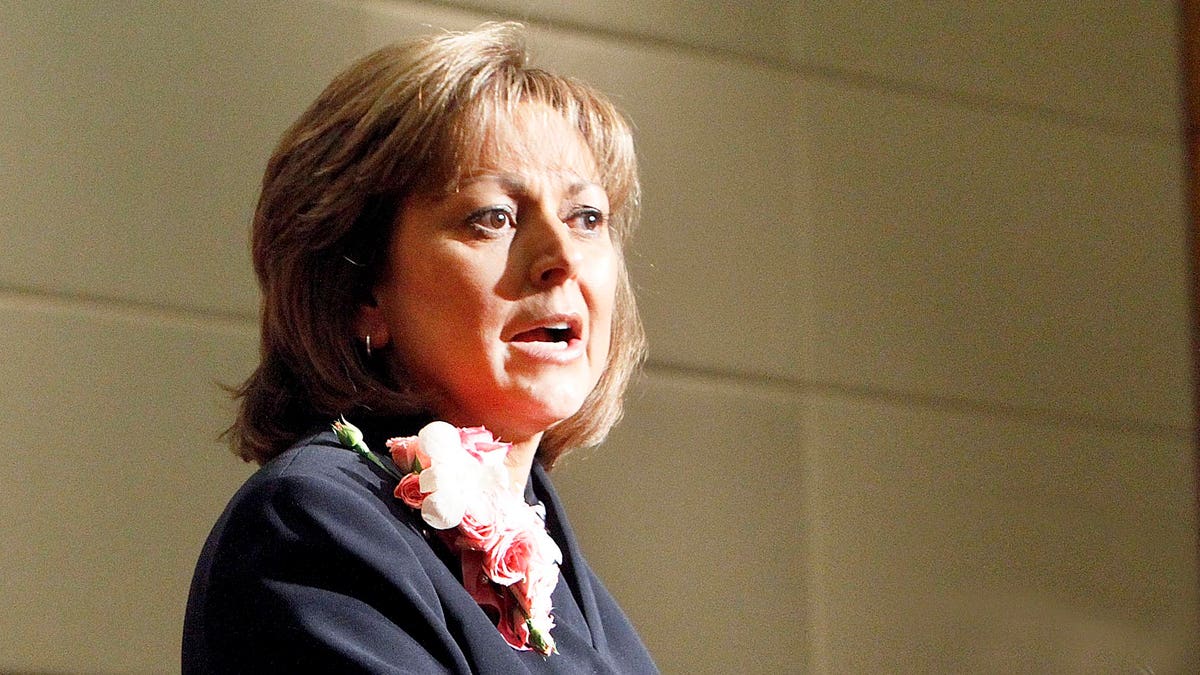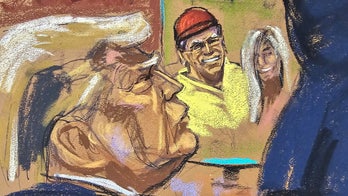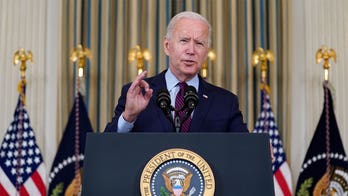
Republican Gov. Susana Martinez outlines her legislative priorities to New Mexico's 112 lawmakers on Tuesday, Jan. 18, 2011 in Santa Fe, N.M. Martinez is reaching out to Democrats as the Legislature returns to work. Martinez used her State of the State speech Tuesday to call for a bipartisan approach to New Mexico's pressing problems, including a $400 million budget shortfall. (AP Photo/The New Mexican, Jane Phillips)
For more stories from our partner Latina Magazine click here.
Last week, Susana Martinez became the first Latina to be elected governor in U.S. history, winning the top job in New Mexico. For the great-granddaughter of Toribio Ortega (the general credited with firing the first shot in the Mexican Revolution) it was a proud moment. But as a pro-life, pro-gun mujer who advocates for a stronger border security, wants to repeal a state law that allows immigrants to get drivers licenses, and says that those things aren’t mutually exclusive with being a Latina—she’s a minority within a minority. Or is she? She talked to us about why Latinos are more conservative than people think and what it means for her to lead the way as a Latina governor.
With so many states with huge Latino populations, what took us so long to get our first Latina governor?
I don’t know [laughs]. I wish I had the answer to that. It’s true of many positions. We haven’t had a good representation, but we’re taking big steps toward having greater Latina representation throughout the country.
How do you feel about going where no Latina has gone before?
I’m very proud of what I have accomplished as a female and as a Latina, but it has come with a lot of hard work and education, and I know that I have to prove myself beyond the fact that I’m a female and Latina.
You want to repeal the law that allows illegal immigrants to get a license in NM and want to make sure that illegal immigrants don’t have access to the state’s lottery scholarship. Some people think of it as selling out. What do you have to say to them?
I think the way you combat that is with information. I have a different perspective. I have been the prosecutor and the district attorney in a border county. We live next to the most violent city in the world. It’s not just that I am Latina and happen to live in the state of New Mexico. But I deal with the criminal element every day and people who have come here to New Mexico illegally with the sole purpose of committing crimes. When I talk to Latinos here in the state of New Mexico and I tell them that that is my focus, they are very much in agreement. If those individuals are arrested for committing crimes—whether it’s trafficking in narcotics or domestic violence, breaking into businesses or rape, need to be placed in a jail—there needs to be a hold on them and they need to be removed from this country because they have proven to be dangerous. That has always been my focus, not only as district attorney, but also as a candidate for governor.
To repeal the law that provides drivers licenses is to make New Mexico less attractive to that kind of element, to keep them from coming here. So how do we distinguish the folks who are coming here to work and to better themselves from those who are coming here to get documentation in order to further their criminal activities?
How do you tell them apart? What about the people who do come here to work and better their families?
That has never been my focus as district attorney or as a candidate for governor. My focus has always been those people who are placed in jail because now they’ve proven to be dangerous. I’ve had lengthy conversations with Hispanic people to distinguish that. For example, you’ll have a Hispanic woman who is here illegally from Mexico who has been raped by her husband, we never want to create the fear that would keep her from calling law enforcement. There has to be a good response, so she can stay in this country and participate in the prosecution of that individual who raped them. We do that and we file the proper documentation for that person to remain in this country to fight for justice. We treat even illegal immigrants who are here and are victims of crime in a way that is positive. They’re not just being deported because they’re here illegally.
As a governor of a border state, what would the ideal comprehensive reform look like to you?
I don’t know what the comprehensive reform act would be, but the first thing we have to do is we have to secure the border. And it’s not just Mexicans. I think that’s what’s so important—people think it’s only about people from Mexico. They are coming from all over the world. And we know this because of the work I do as a prosecutor. They are coming from all over the world and finding the weakest part of the country from which to enter the country illegally, and that just happens to be the Mexican border.
Do you support the DREAM Act?
Remind me. I know that the scholarship…
The DREAM Act is the law that people have been trying to pass for 10 years that would allow children of illegal immigrants to stay in the country as long as they go to college or perform military service.
Oh, yes, yes, yes. OK, I do know that. I think that has to become part of the comprehensive immigration reform that the government has failed to take on and take on in a very serious way. What I am concerned about is that we have New Mexico citizens who want to attend college and there’s only so much funding to go around. Are we excluding people that are in New Mexico who are in the military service and have served our country and are here legally and cannot receive that kind of funding to attend college because the funds are limited? The DREAM Act has to be a part of federal comprehensive immigration reform, but we have to secure the border first. I can’t emphasize that more. We live next door to the murder capital of the world and we have fought so hard to keep that violence from crossing but you’re already seeing that violence come over in places like El Paso, Texas and New Mexico, and that has to come first.
You got a strong backing from Hispanics in the state, though nationwide, two-thirds of us back Democrats. Do you think we’re actually more conservative than people think?
Sure they are. My parents were Democrats and I registered as a Democrat because that’s what my parents did, and I didn’t give it a lot of thought. I was involved in the Democratic Party in Doña Ana County, until two individuals who I knew were Republicans had a conversation with my husband. We never used the words Republican or Democrat, never used the words conservative or liberal, we just talked about what was important to us in life; whether we’re pro-life, whether government should be imposed upon us in every aspect of our lives, whether welfare should be a way of life or should it be a handout to help someone in tough times. We talked about many issues and realized that we were more in line with Republicans. I think if we stopped using single words that define us or try to define us completely, that we’d better understand where we stood on the issues.
A lot of governors have run for and become presidents in the past. So am I speaking to the first Latino president or candidate? Are you interested in that?
You’re actually speaking to the first Latina governor of New Mexico and only that. [Laughs]. There’s a lot of work to be done in New Mexico and that’s where my commitment truly is. To make sure we get this right. We have to prove that we can pull together and do this right. As a female and a Latina—it’s not that that will be historic. It will be the results.




